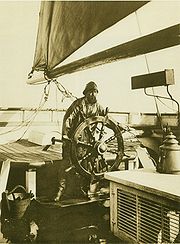- Oilskin
-
Ölzeug (engl.: Oilskin) bezeichnet wetterfeste Oberbekleidung in der Seefahrt, die den Träger vor Nässe und Wind schützen soll, sowie die ebenfalls wetterfesten australischen Reitermäntel.
Ursprünglich wurde diese Kleidung aus einem Leinenstoff hergestellt, dessen Oberfläche mit Öl, oftmals Leinöl, imprägniert wurde, um ihn wasserdicht zu machen. Ab Mitte des 19. Jahrhunderts wurde auch Kautschuk zum Abdichten des Gewebes genutzt. Doch erst mit der Erfindung der Vulkanisation durch Charles Goodyear konnten erstmals 100% wasserdichte und stabile Textilien gefertigt werden. Mit dem Aufkommen von synthetischen Kunststoffen wie PVC (Polyvinylchlorid) im 20. Jahrhundert, kam das gummierte Gewebe allmählich aus der Mode, da es verhältnismäßig schwer und nicht hinreichend beständig gegen UV-Strahlung, Teer, Öl und Fett war. Obwohl die Kleidungsstücke für Seeleute heutzutage aus modernen synthetischen Stoffen wie zum Beispiel Gore-Tex oder Sympatex gefertigt werden, hat sich der alte Name Ölzeug erhalten. Die Reitermäntel erlangen ihre Wasserfestigkeit durch Tränken von Baumwolle mit Wachs.
Anmerkung: Die Bezeichnung „Teerjacken“ für Matrosen hängt damit zusammen, könnte aber eher als ungenaue Übersetzung von engl. „Jack Tar“ (ebenfalls für Matrose) entstanden sein: Der Allerweltsname Jack verbunden mit Tar (Teer), was auf die schmutzige Arbeit des Kalfaterns hinweist.
Ölzeug wird in verschiedene Klassen unterteilt - man unterscheidet zwischen leichtem Ölzeug, das zwar wasserdicht aber atmungsaktiv ist und schweren Ölzeug, das aus stärkeren Materialien gefertigt wird. Dabei werden auf eine Membrane auf zwei Seiten Stoffe laminiert (eine extrem dünne und empfindliche Folie wird auf den Stoff "aufgeklebt").
Siehe auch: Seglerbekleidung
Wikimedia Foundation.


